Addition Teaching Resources
Introduce addition this school year with printable worksheets, digital activities, adding games, addition word problems, flashcards and more to help students understand how to add numbers and apply addition strategies to math problems.
This teaching resource collection was created by the teachers on the Teach Starter team for elementary teachers. Each of the curriculum-aligned resources has been carefully reviewed and curated by our expert teachers to make sure it's ready to use with your students! Browse printables and digital activities for teaching students how to make 10, how to add integers and more, plus find differentiated resources to help you meet each student's needs!
New to teaching addition, or just looking for new ways to engage your students? Read on for a primer from our teacher team, including a kid-friendly definition and some common vocabulary!
What Is Addition? A Kid-Friendly Definition
Let's start with a definition of this math operation that's easy for them to understand!
Addition is a math operation that involves combining two or more numbers to find a total. The symbol (+) is used to indicate addition, and this is called a plus sign.
Here's an example of addition at work!
In the equation 2 + 3 = 5, the numbers 2 and 3 are added together to get a sum of 5.
Addition Terms for Kids to Learn
There are plenty of new vocabulary words for your students to learn when introducing addition. Here are some of the terms you will want to start off with.
Sum
The sum is the result of adding two or more numbers. It's the solution or answer to an addition problem!
In the equation 2 + 3 = 5, 5 is the sum.
Addend
The numbers being added in an addition equation are called addends.
In the equation 2 + 3 = 5, for example, both 2 and 3 are addends.
Commutative Property
The commutative property states that changing the order of the addends in your addition problem does not change the sum.
For example, 2 + 3 is the same as 3 + 2.
Associative Property
The associative property states that changing the grouping of the addends in your math problem will not change the sum.
For example, (2 + 3) + 4 is the same as 2 + (3 + 4).
Repeated Addition
Sometimes a math problem involves adding the same number multiple times. We call this repeated addition, and it's a way to find the product of two numbers where one of the numbers is repeated a certain number of times.
Repeated addition is handy for helping students understand multiplication. After all, multiplication can be thought of as repeated addition.

Cartoon plus sign
What Is Partial Sums Addition?
If you know what a sum is, you're halfway to understanding partial sums addition! This math vocabulary term refers to adding two or more numbers by breaking apart the addends and adding the value of the digits in each place value position from right to left.
This handy strategy is great to use with students when they are first learning to add two or more numbers. Partial sums addition breaks down the process of addition into smaller, more manageable steps.
Let's look at an example.
If you have the 36 + 27 and want to use partial sums addition, you start by determining the value of the digits in the ones place, adding them together, and writing down the sum (6 + 7 = 13).
Next, add the value of the tens place digits together (30 + 20 = 50), and write down the answer under the previous sum. Add together the two partial sums to get your answer, 63.
- Plus Plan
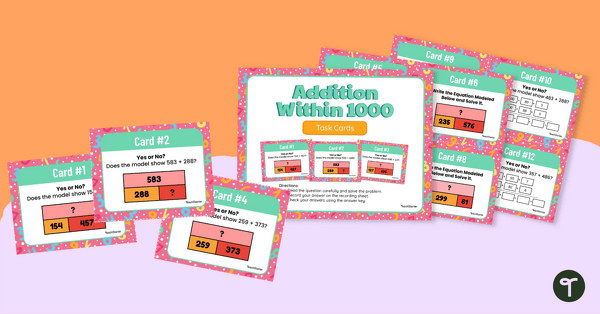
Adding within 1000 Addition Strategy Task Cards
Practice using a number of addition strategies to add numbers within 1000 with this set of task cards.
- Plus Plan
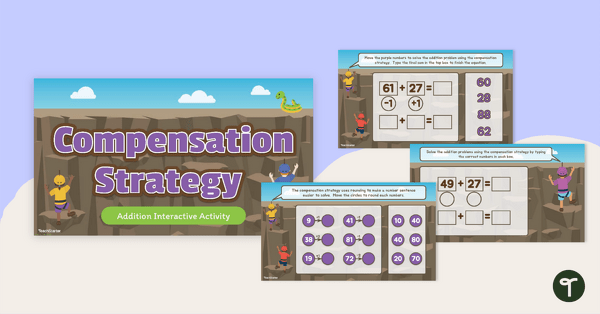
Compensation Strategy Addition Interactive Activity
Practice using the addition compensation strategy with this fun interactive activity.
- Plus Plan
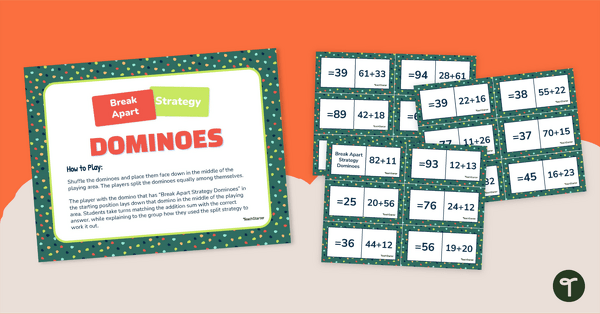
Break Apart Strategy Addition Dominoes
Practice using the break apart strategy with this set of two-digit addition dominoes.
- Plus Plan
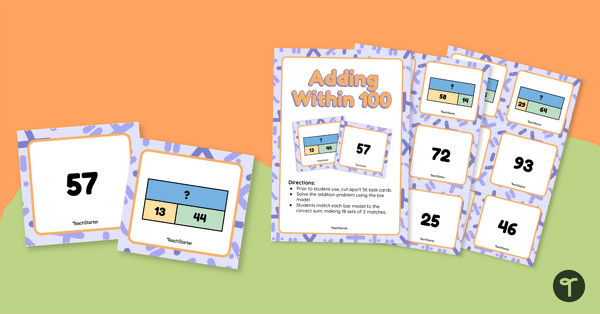
Adding Within 100 - Strip Diagram Match-Up Activity
Practice using the tape diagram to add numbers within 100 with this match-up activity.
- Plus Plan
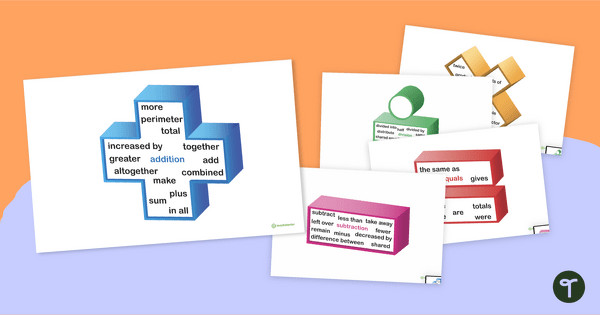
Math Symbols Posters with Vocabulary
Students can often identify the mathematical symbol, but what about all of the different names for it?
- Plus Plan
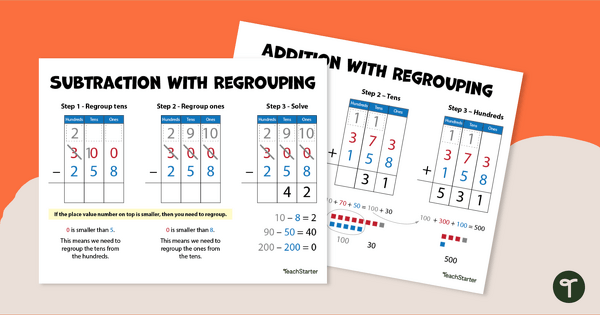
Addition and Subtraction with Regrouping - Posters
Break down the steps to use regrouping to find a solution with an addition and a subtraction poster.
- Plus Plan
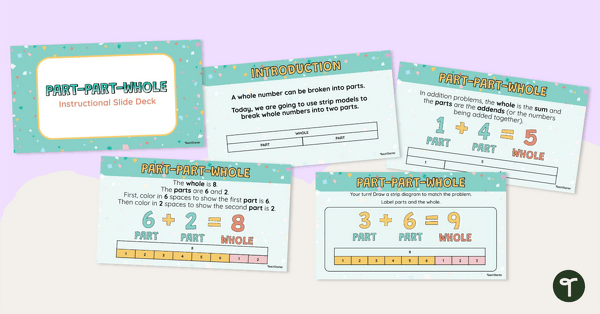
Part-Part-Whole - Addition and Subtraction Teaching Slides
Teach your students how to effectively use a bar model to solve 1-digit addition and subtraction number facts using the part-part-whole strategy.
- Plus Plan
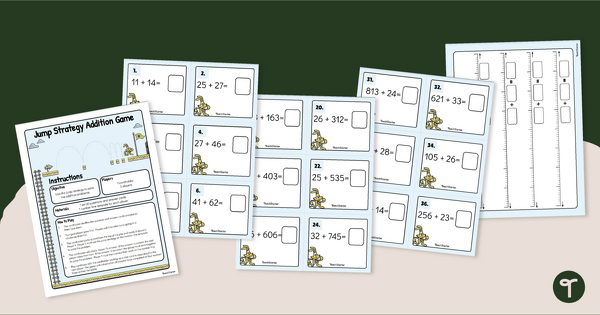
Jump Strategy - Number Line Addition Game
Practice using the jump strategy for multi-digit addition with a fun math game.
- Plus Plan
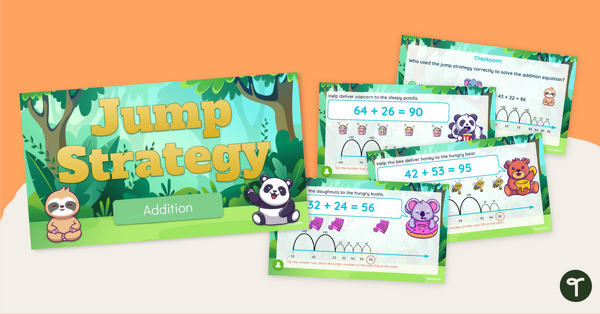
Addition on a Number Line - Jump Strategy Slide Deck
Teach your students to add two-digit numbers using the jump strategy with an instructional teaching presentation.
- Plus Plan
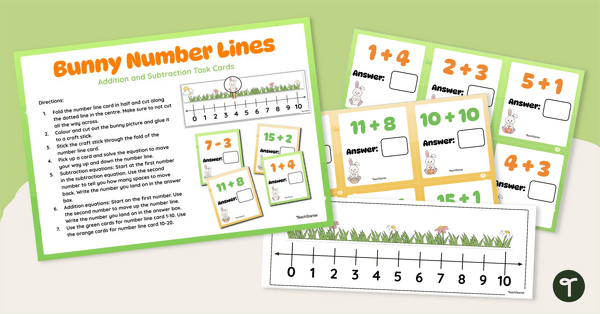
Bunny Number Lines - Addition and Subtraction Task Cards
Hop down the number line with the Easter Bunny to practice addition and subtraction on a number line.
- Plus Plan
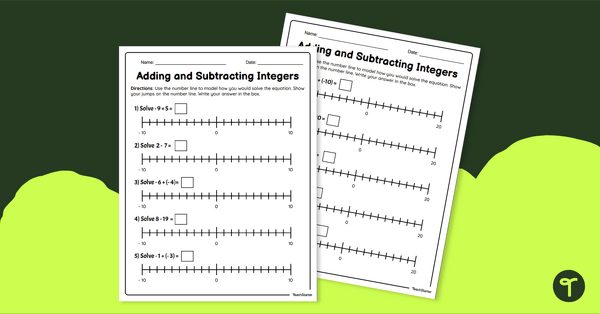
Adding and Subtracting Integers on Number Lines - Worksheet
Help your students learn to add and subtract integers on a number line with a printable adding and subtracting integers worksheet.
- Plus Plan
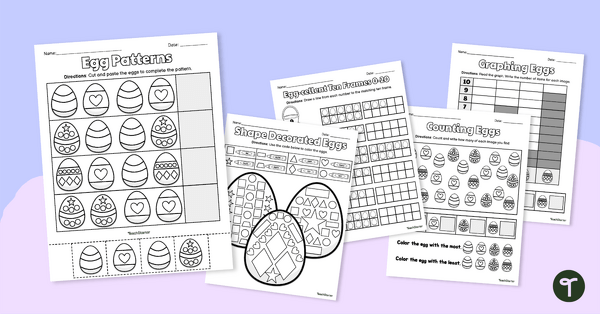
Kindergarten Math Review - Easter Worksheets
Practice various Kindergarten math concepts with a pack of Easter worksheets.
- Plus Plan
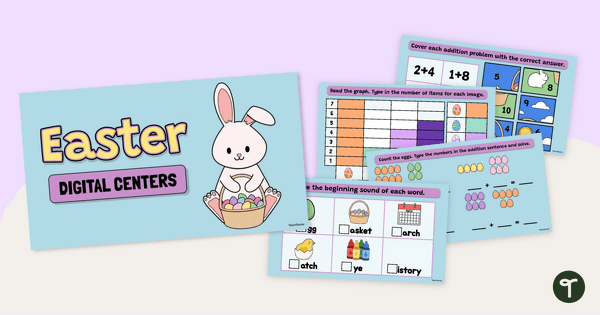
Easter Literacy and Math Centers - Digital Learning Activity
Lost the lesson-planning stress this Easter season with an exciting no-prep digital Easter Literacy and Math center.
- Plus Plan
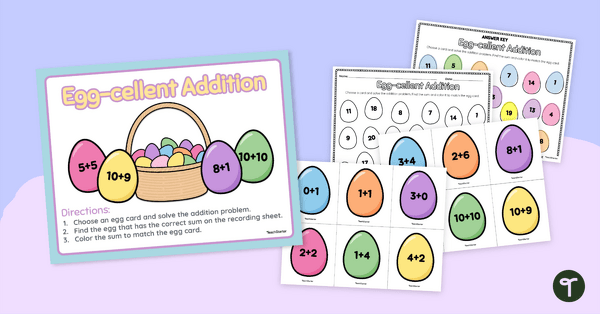
"Egg-cellent" Easter Addition Activity
Practice simple addition with this Easter math center.
- Plus Plan
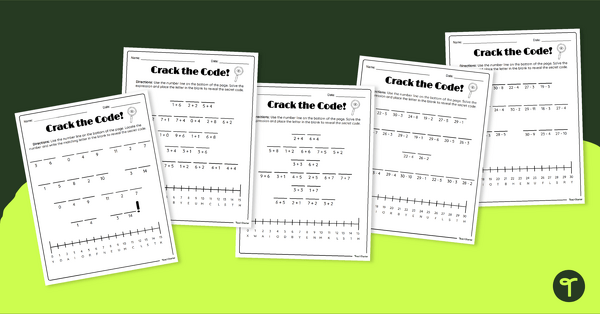
Secret Code Number Line - Worksheet
Crack the number line code with five number line codebreaker worksheets to practice number identification, addition, and subtraction.
- Plus Plan
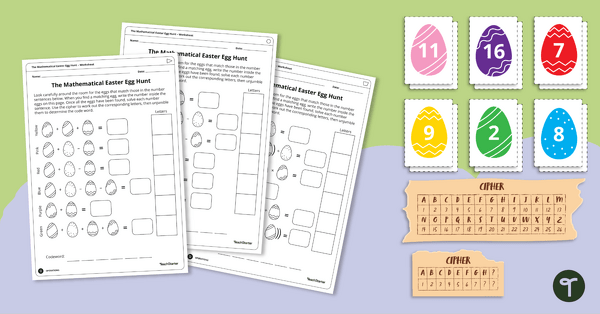
The Mathematical Easter Egg Hunt
Solve number sentences and determine the codewords with this differentiated Easter egg hunt activity.
- Plus Plan
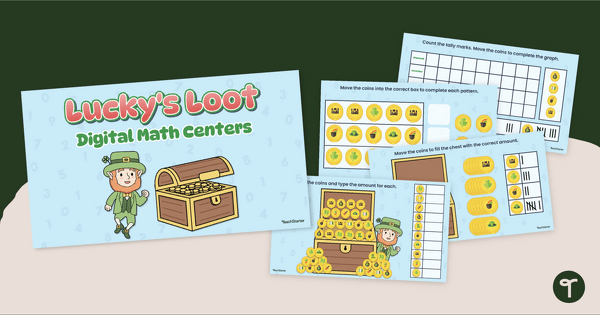
Lucky's Loot - Digital St. Patrick's Day Math Activity
Save time lesson planning with a St. Patrick's Day Digital Math Activity that reviews multiple math concepts at once!
- Plus Plan
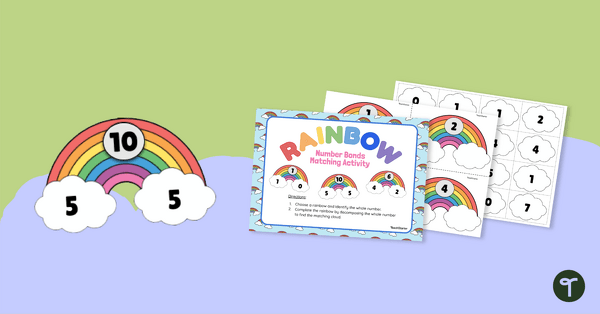
Rainbow Number Bonds - Math Game
Practice number bonds with this fun rainbow-themed hands-on activity.
- Plus Plan
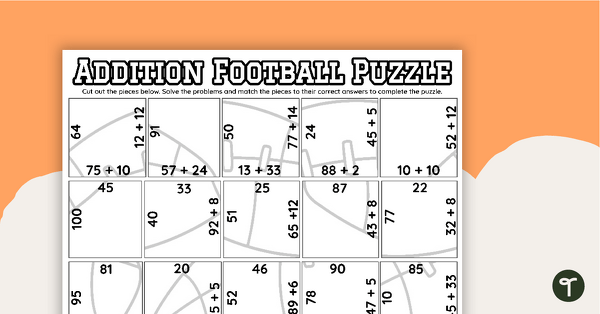
Football Tarsia Puzzle - 2 Digit Addition
Print and assemble a football-themed tarsia puzzle to use when practicing two-digit addition skills.
- Plus Plan
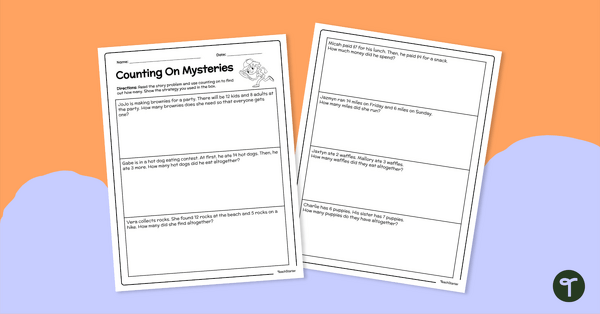
Counting On – Word Problem Worksheet
Practice adding within 20 by using the counting on strategy to solve word problems.
- Plus Plan
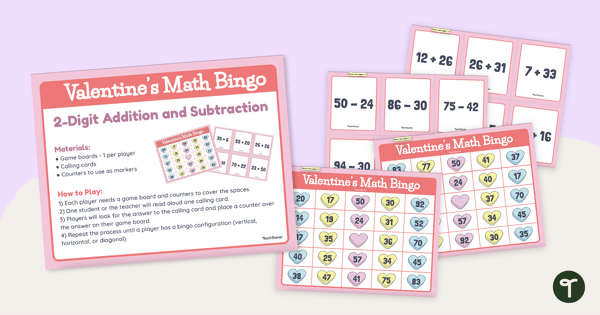
Valentine Bingo - 2-Digit Addition and Subtraction Game
Add and subtract two-digit numbers to win this fun Valentine’s Bingo Game!
- Plus Plan
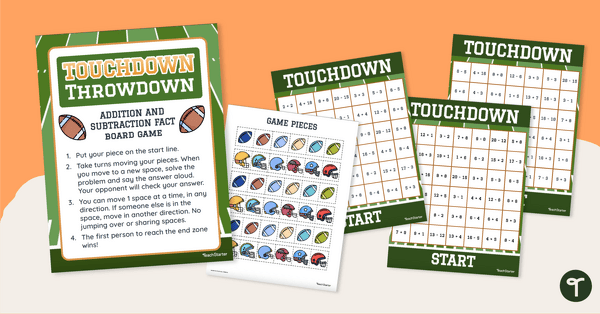
Touchdown Throwdown Addition Game
Win the addition fact championship with a football-themed partner game!
- Plus Plan
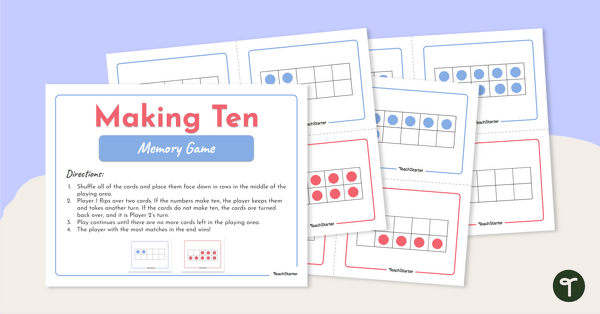
Making Ten Memory Game
Practice making ten using ten frames with this fun memory game.
- Plus Plan
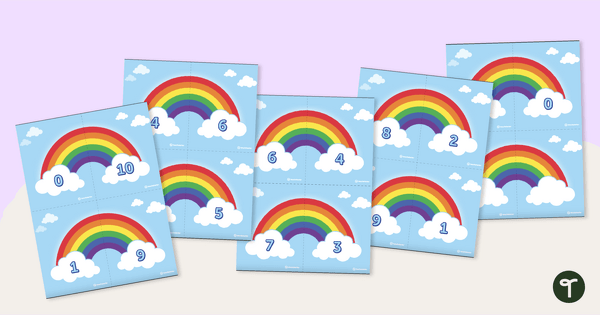
Friends of 10 - Addition Match-up Activity
A set of 22 matching cards to explore the number combinations of 10.
- Plus Plan
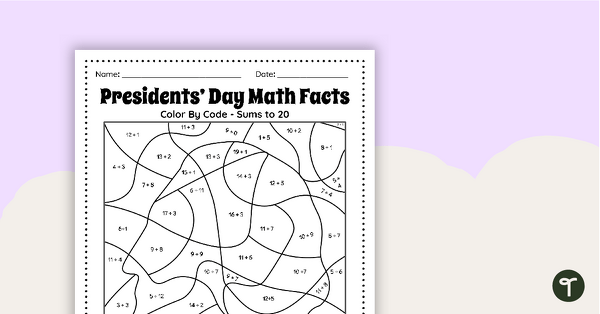
Presidents' Day Color by Number - Addition
Practice adding single-digit numbers with sums to 20 with a Presidents’ Day Color By Number Worksheet.
- Plus Plan
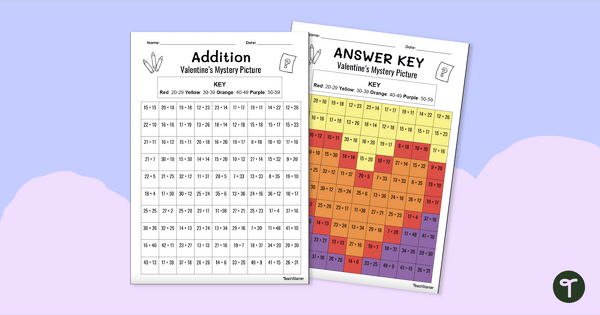
Color-by-Number Valentine's Day Addition Worksheet
Have fun with your Valentine’s Day Math practice with an addition color by number worksheet.
- Plus Plan
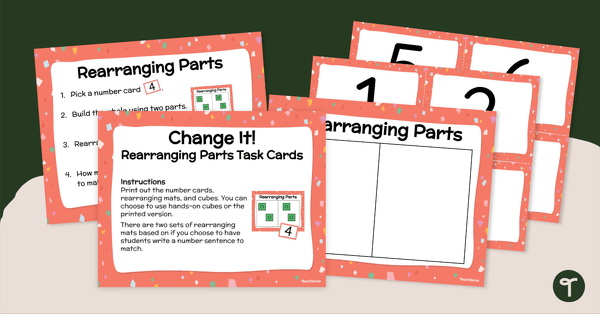
Change It! – Rearranging Parts Activity
Practice rearranging the parts of whole numbers into different combinations with this math activity.
- Plus Plan
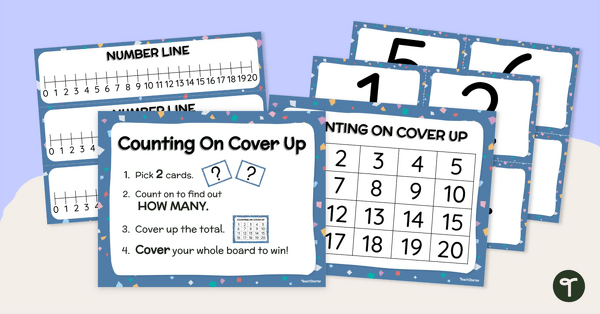
Counting On Cover Up Game
Practice the counting-on strategy with this engaging cover-the-board game.
- Plus Plan
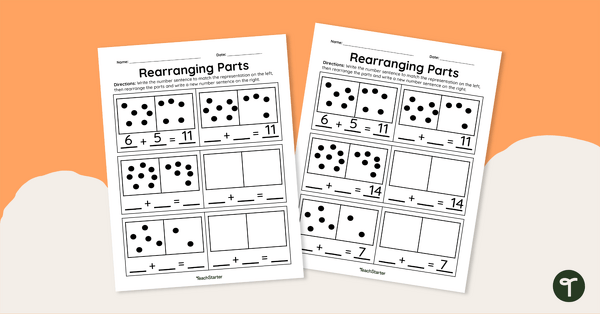
Rearranging Parts – Worksheet
Rearrange the parts of an addition problem to form new number sentences with this worksheet.
- Plus Plan
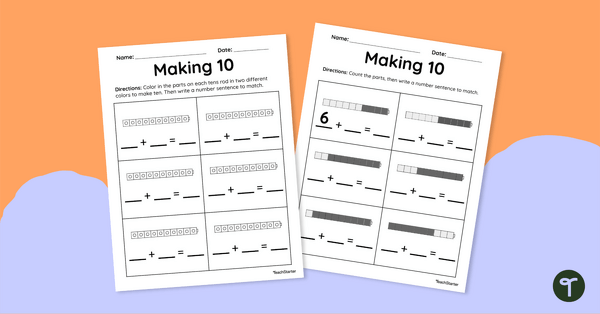
Making 10 – Worksheet
Practice the addition strategy of making ten with this math worksheet.
- Plus Plan
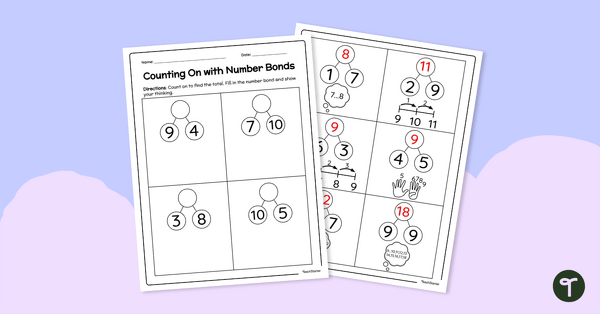
Counting On with Number Bonds – Worksheet
Begin from the larger number and count on to find the total with this worksheet.
- Plus Plan
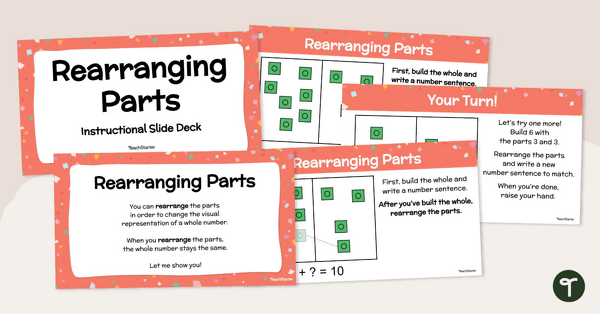
Rearranging Parts – Instructional Slide Deck
Learn how to decompose numbers less than or equal to 10 into pairs in more than one way with this instructional slide deck.